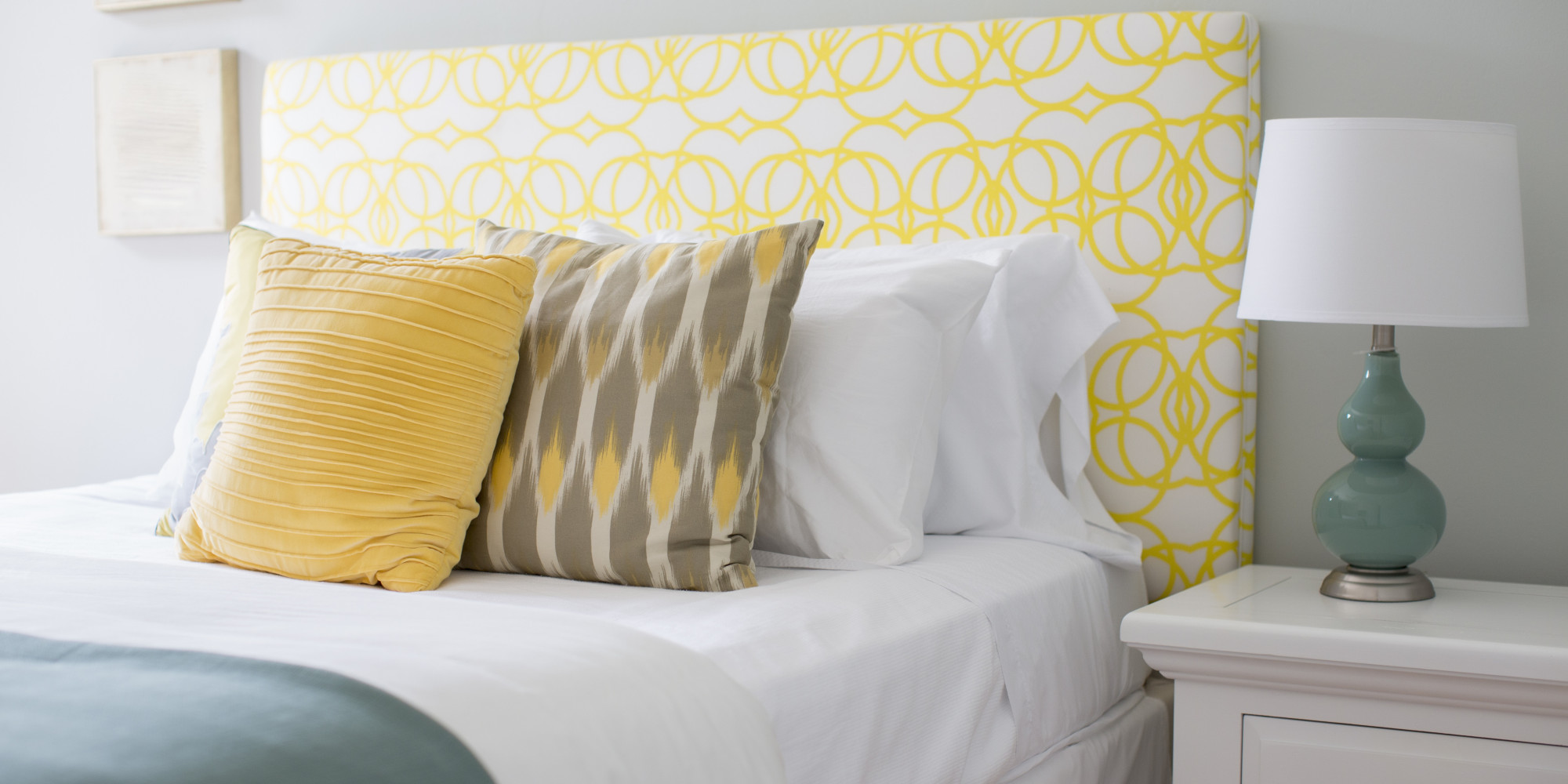
See how a few simple tweaks could turn your bedroom into an oasis of restful sleep and sweet dreams.
Did you know that your bedroom can affect your quality of rest? From temperature to light and more, scientific studies and sleep researchers have found that our environments have real and measurable effects on sleep.
Whether you just want to give yourself the best foundation for rest or you’re seeking to overcome sleep issues, optimizing your bedroom can help dreams come easier.
9 Ways to Make Your Bedroom Better for Sleep
We’ve put together nine of the best ways you can enhance your space for sleep according to leading sleep hygiene experts and recent studies. Read on to learn what environmental changes can have the biggest impact on rest.
1. Cool it Off
Ever feel too hot or sweaty to sleep? It’s not in your head; warmer temperatures do really affect sleep quality. The optimal temperature range for rest according to most sleep experts is somewhere in the range of 60 to 72 degrees Fahrenheit.
If you don’t want to leave the air conditioning on blast all night, you could go the greener route of installing a ceiling fan, using an electric fan, or opening windows when nighttime temperatures are cool. Cooling mattress pads and lighter weight bedding can also help.
Try different thermostat settings to see what feels most comfortable to you, as each person will vary. If you are a furnace and your partner is left shivering, it may also be helpful to use different comforter weights so you can both sleep optimally.
2. Keep it Dark
Residing in the hypothalamus, your Suprachiasmatic Nucleus is what controls your internal clock, based on light signals received via your eye’s optic nerves. When light is detected, it delays melatonin release, produces cortisol and keeps your body temperature raised, initiating wakefulness.
According to studies, exposure to electrical light both before and during sleep suppress melatonin, the hormone responsible for regulating sleep-wake cycles. In animal studies, even dim lights have shown negative effects. Thus, darkness is important for deep, restorative sleep and a regular sleep clock.
Inside your room, try to turn off or cover any electronic lights before bed. If you’re concerned about finding your way to the bathroom at night, a motion-activated night light or under-bed light can light the way when needed without disturbing rest.
If your windows let in light or you tend to sleep past sunrise, it may also be worthwhile to invest in blackout window shades to keep your bedroom dark (these can have insulative benefits as well).
If blocking all light isn’t practical or feasible in your space, you could always opt for a sleep mask that covers your eyes. Look for one with a comfortable but fitted band and smooth, breathable fabric like fine cotton, satin, silk or rayon.
3. Block Bothersome Sounds
From televisions to neighbors to nearby snorers, there are many sounds that can make it hard to get to sleep or wake you up during the night. Noises can also affect deep sleep cycles, even if you don’t remember waking.
If you live in an environment with noise that’s outside of your control and find it affects your rest, earplugs or a white noise machine could help. White noise or calming nature sounds blur background noise and can make it easier to doze off.
When it comes to snoring partners, earplugs and white noise could also provide a little relief. You could also gently reposition them (poorly positioned pillows and back sleeping make snoring more likely). But, if the snoring is extremely loud or it sounds like your partner stops breathing, bring it to their attention, as this could be a sign of sleep apnea.
4. Banish the TV
Even though it can feel relaxing to kick back in bed and watch your favorite shows, research has shown that televisions actually steal sleep.
The motion and sound keeps your mind stimulated, and the light prevents your body’s internal clock from regulating sleep properly. In infants and kids, television before bed is also associated with several sleep problems, including resisting bed and increased anxiety.
Try to keep your family’s TV viewing in the living room, or at least turn the tube off 30 to 60 minutes before you want to sleep. Opt for less stimulating activities like reading, a bath or light yoga, which are more conducive to rest.
5. Kick Out Other Electronics, Too
It’s not just the TV stealing your sleep at night; your laptop, tablet, phone and other electronics (especially those with bright LED lights) also share the blame.
One study found that the blue light emitted by LEDs worked against melatonin, even more than regular white lights. Another study found that the glow of computer screens may also have similar effects.
In addition to the stimulating effects of lights, working or checking emails before bed can also induce stress, surfing the internet can keep your mind active longer, and checking social networks can bring negative feelings as well.
Institute an electronics ban in the hour before bed to give yourself time to wind down. Leave devices out your reach when in bed, and leave phones on silent if possible. Several “do not disturb” apps for iOS and Android can block out unimportant notifications while you sleep, only letting through emergency messages from approved contacts.
6. Use the Right Bedding
Certain fabrics have “moisture-wicking” properties, meaning they absorb excess moisture and keep you more comfortable. These include cotton, wool, silk, bamboo and linen, while others like polyester and synthetic satin can actually trap moisture and make you warmer.
You don’t need the highest thread count sheets on the market, but bedding fabrics should feel nice against your skin and not distract you from getting cozy. If you live an area with distinct winters and summers, using different bedding (thicker for winter/thinner for summer) can also help keep you comfortable.
If dust or mold allergies are a concern, many experts recommend using allergen-proof mattress and pillow covers and frequently washing bedding to help reduce sleep-stealing allergens.
7. Eliminate Clutter
A disorganized or cluttered space can distract you from drifting off and keep you from feeling relaxed. Spending just a few minutes a day decluttering and ensuring things have a “home” can have a big impact.
Try to keep bills, office/schoolwork and other papers confined to an office space or otherwise out of sight. Use a closed hamper to keep clothes out of the way. And, keep dishes in the kitchen and trash in a trashcan.
A nightstand drawer or cute basket can hold odds and ends, keeping your space neat and your essentials still within reach. For larger items, a dresser or shelf with cubbies can provide a space to keep things out of the way.
8. Ensure Mattresses Are Comfortable
Your mattress is an important part of the sleep equation. The Better Sleep Council says mattresses should be replaced after 5 to 7 years, and Consumer Reports says replace whenever the bed is no longer comfortable.
People keep their beds around 10 years, on average, but if your mattress shows deep impressions or causes painful pressure points, it may be past its prime. One study found that simply swapping out old mattresses (average age 9.5 years) with new beds improved stress and reduced back pain for participants.
Check your bed for signs of wear (like deep impressions over 1.5 inches), and pay attention to your body as well. If you wake with aches and pains that fade within a couple of hours, it may be sign your mattress lacks support.
Keep in mind that changes in age, weight and health can also change comfort needs, even if the mattress itself is still in decent shape.
9. Keep Pillows Fresh
Pillows also prove important to comfort, and they should be replaced more often than mattresses. Down alternative and poly fill pillows may need to be replaced every 1-2 years, while memory foam, latex, down, and buckwheat pillows can last a few more years with good care.
If a pillow is too flat, too thick or no longer providing adequate cushioning, it can contribute neck pain, back pain, or pressure points. So, if your mattress is still in decent shape, but you have neck pain, your pillow could be the problem.
Web MD says back sleepers should look for a thinner pillow with neck support in the lower third, side sleepers should opt for a firmer pillow that supports the natural distance between the ear and shoulder, and stomach sleepers should use a very thin or no pillow.
Additionally, pillows (or at least covers) should also be washed regularly to reduce bacteria and allergens that could make sleep less comfortable.
Transforming Your Bedroom
Cool, dark, relaxing, cozy, and distraction-free are the key concepts to keep in mind when optimizing your bedroom for sleep. These bedroom optimization ideas also apply to children’s rooms and can be helpful if you are setting up a guest room for visitors, as well.
Making gradual adjustments can make it easier if there are several things you want to change. For example:
- Week 1: Make your bedroom cooler, reduce clutter, and leave phones on silent.
- Week 2: Turn off the TV 30 minutes earlier and reduce other light sources.
- Week 3: Start turning the TV off 60 minutes before bed and introduce a white noise machine if needed.
- Week 4: Assess mattress/bedding/pillows, and consider removing the TV and other electronics from your bedroom.
We all have different tolerances and preferences, so listen to your body and note what feels best for you. You may not need to make every change suggested by sleep hygiene experts, rather the key takeaways are to make rest a priority in your routine and to establish a bedroom that caters to sleep above all else.
This article originally appeared on the Amerisleep blog.
Rosie Osmun is the Creative Content Manager at Amerisleep, a progressive memory foam mattress brand focused on eco-friendly sleep solutions. Rosie writes more posts on the Amerisleep blog about the science of sleep, eco-friendly living, leading a healthy lifestyle and more.
Article source: https://www.huffingtonpost.com/entry/optimize-your-bedroom-for-better-sleep_b_8535178.html?utm_hp_ref=bedroom-ideas


